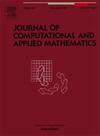用于求解广义绝对值方程的高效牛顿型矩阵分割算法及其在脊回归问题中的应用
IF 2.1
2区 数学
Q1 MATHEMATICS, APPLIED
Journal of Computational and Applied Mathematics
Pub Date : 2024-10-22
DOI:10.1016/j.cam.2024.116329
引用次数: 0
摘要
本文提出了一种求解广义绝对值方程(GAVE)的基于牛顿的广义矩阵分割(GNMS)方法。在温和条件下,GNMS 方法能收敛到广义绝对值方程的唯一解。此外,我们还可以得到一些现有方法的较弱收敛条件。数值结果验证了所提方法的有效性。本文章由计算机程序翻译,如有差异,请以英文原文为准。
An efficient Newton-type matrix splitting algorithm for solving generalized absolute value equations with application to ridge regression problems
A generalized Newton-based matrix splitting (GNMS) method is proposed for solving the generalized absolute value equations (GAVEs). Under mild conditions, the GNMS method converges to the unique solution of GAVEs. Moreover, we can obtain a few weaker convergence conditions for some existing methods. Numerical results verify the effectiveness of the proposed method.
求助全文
通过发布文献求助,成功后即可免费获取论文全文。
去求助
来源期刊
CiteScore
5.40
自引率
4.20%
发文量
437
审稿时长
3.0 months
期刊介绍:
The Journal of Computational and Applied Mathematics publishes original papers of high scientific value in all areas of computational and applied mathematics. The main interest of the Journal is in papers that describe and analyze new computational techniques for solving scientific or engineering problems. Also the improved analysis, including the effectiveness and applicability, of existing methods and algorithms is of importance. The computational efficiency (e.g. the convergence, stability, accuracy, ...) should be proved and illustrated by nontrivial numerical examples. Papers describing only variants of existing methods, without adding significant new computational properties are not of interest.
The audience consists of: applied mathematicians, numerical analysts, computational scientists and engineers.

 求助内容:
求助内容: 应助结果提醒方式:
应助结果提醒方式:


